In depth
9. In depth
How universities are fighting climate change
In the face of the current global climate emergency, characterized by natural disasters on an unprecedented scale and environmental degradation of unimaginable proportions, universities cannot simply continue to fulfil their classic teaching and research missions. They must become social actors more committed to the world we live in.
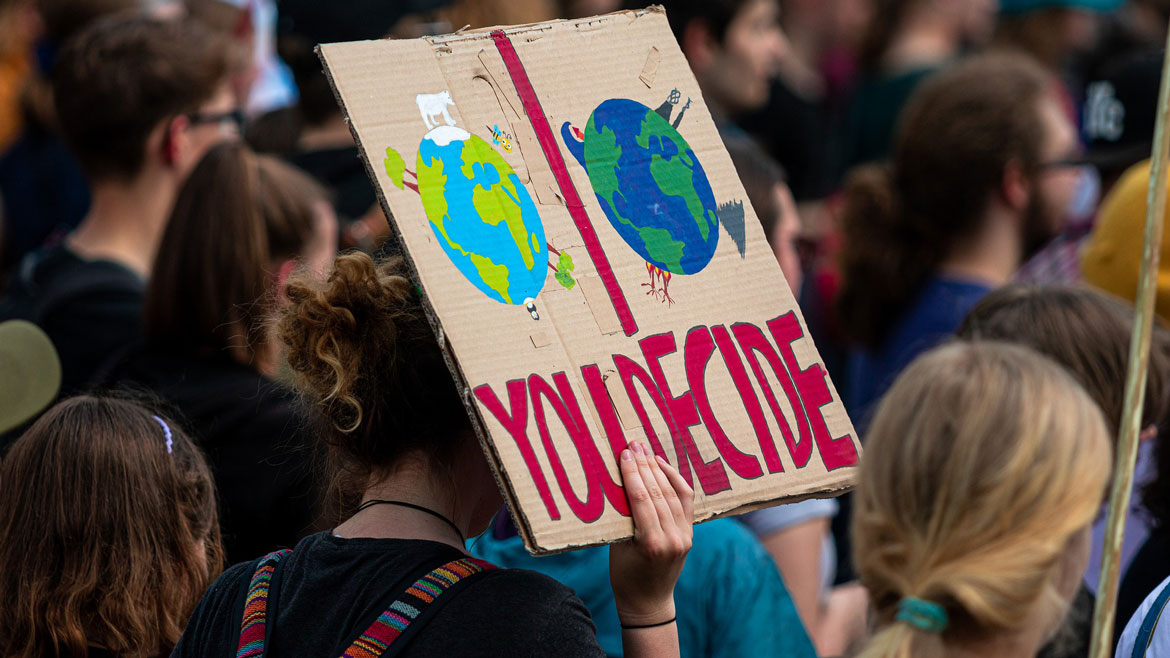
‘At school, they talked about it a lot, and we worked on it in a lot of subjects. They may not have thought about it or realized, but when you tell kids about such a serious problem, it causes them a lot of distress. That distress is what made young people feel like either we take to the streets and start shouting or nothing is going to change. And if nothing changes, we are looking at a very dark and difficult future, with no room for optimism’, said Dan Vivas, a third-year materials engineering student at Universitat Politècnica de Catalunya · BarcelonaTech (UPC).
In May 2019, in the midst of the enthusiasm surrounding the global Fridays for Future movement, led by the activist Greta Thunberg, Dan and other young people from his faculty got UPC to issue a climate emergency declaration. ‘It was a lesson for everyone’, recalled Gemma Fargas, vice-rector for Social Responsibility and Equality at UPC. ‘It was the students who got the university to position itself as an asset to respond to an emergency.’
UPC was the first university in Spain to make such a declaration. It was followed by Pompeu Fabra University (UPF) and then the rest of the Catalan and Spanish universities. The purpose of the declaration was twofold: to pressure governments to start taking steps to deal with the current environmental crisis; and to commit to making a greater effort to fight climate change.
‘Once UPC issued its climate emergency declaration, at UPF, we also wanted to act’, recalled Ester Oliveras, the rector’s delegate for sustainability and a lecturer in the Department of Economics and Business. ‘We created the Climate Emergency Roundtable and drew up an initial list of measures that could be implemented quickly. Some were already in place, such as recycling paper or plastic. We wanted to take that further and include office supplies, such as pens or computers, that we were not being recycled’, explained Oliveras.
‘Universities can no longer focus only on their classic teaching and research missions, now we have to add another: social responsibility. We are one more actor in the system and that makes us co-responsible for the world we live in.’
However, when an institution like a university declares a climate emergency, it needs to approach the problem with a global strategy, to meet the challenges posed by climate change through both research and teaching.
What role do universities play?
According to the United Nations, natural disasters are currently happening on an unprecedented and unpredictable scale, at a rate of once a week. The world is facing environmental degradation and a loss of biodiversity of unimaginable proportions. This ecosystem destruction is already causing – and will increasingly continue to cause – conflicts and migrations that will impact people’s health, have high economic costs and put the food supply of seven billion people at risk.
In this situation, ‘universities can no longer focus only on their classic teaching and research missions’, said Mònica Figueras, vice-rector for Social Commitment and Equality Projects at UPF. ‘Now we have to add another: social responsibility. We are one more actor in the system and that makes us co-responsible for the world we live in.’
Universities have always been bastions of knowledge and wisdom; now they have a key role to play in the present and future climate change scenario. ‘Universities not only train future doctors, engineers and economists, they also produce responsible citizens, capable of influencing the entire society’, said Marta Pérez-Vallmitjana, the rector’s delegate for Sustainability at the University of Barcelona (UB).
‘In this regard, and based on the United Nations Sustainable Development Goals (SDGs), which, for the first time, called upon universities (previously, only primary and secondary school education were mentioned), we have to become hubs for raising awareness of sustainable development, both environmentally and socially’, she added.
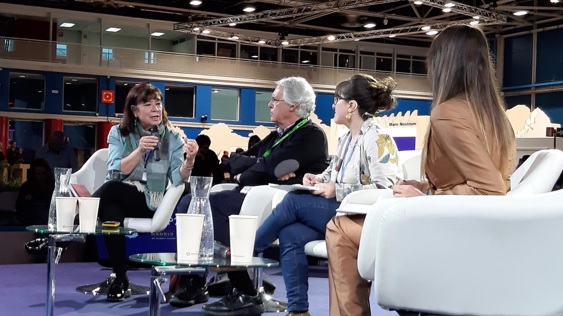
As educational institutions, university centres have unparalleled potential. First, several million students graduate from universities each year around the world. They need to be prepared to face a situation that will be shaped by climate change.
Second, universities have a wealth of intellectual sources and a collaborative environment, which makes it possible for different departments and disciplines to work together across the institution to address the climate emergency and provide solutions.
Finally, in addition to reducing their own environmental impact as large institutions, the sustainability actions they take serve as an example for other institutions, companies and schools. In this regard, university networks have already been created made up of thousands of schools around the world, with the aim of joining forces to achieve carbon neutrality by 2050 at the latest.
‘We need a global strategy for climate change that includes both promoting more research aimed at solving the future challenges posed by this emergency and teaching aimed at training future generations in this regard. No matter what students study, they need to have knowledge about sustainable development and the climate emergency. And, obviously, we have to reduce our carbon footprint as an institution.’
According to Oliveras, ‘We need a global strategy for climate change that includes both promoting more research aimed at solving the future challenges posed by this emergency and teaching aimed at training future generations in this regard. No matter what students study, they need to have knowledge about sustainable development and the climate emergency. And, obviously, we have to reduce our carbon footprint as an institution.’
It is precisely in these three areas that Oliveras cited that universities are organizing and planning the actions to be carried out.
Reducing CO2 EMISSIONS
Most Catalan universities have endorsed the agreement to reduce emissions proposed by the Catalan government, which involves becoming carbon neutral by 2050.
As service centres, their energy expenditure is mainly due to transport and the consumption of their buildings. UPF alone, which is a small university compared to others such as UB or the Autonomous University of Barcelona (UAB), moves around 20,000 people a day, between employees and students.
‘About 90-95% of our emissions are from the energy we use to operate the buildings, for lighting, heating, computers, etc., and daily commutes to and from the faculties. They are also due to international travel, because we are a very research-intensive university’, said Martí Boleda, the UPF environment and safety officer, who recently coordinated a study to calculate the university’s carbon footprint.
Like the rest of the universities, UPF already buys green energy, and it is drawing up a Mobility Plan to promote the use of sustainable transport, from bicycles, scooters and electric motorcycles to walking or public transport. To this end, it is already working closely with the Barcelona City Council and TMB, the Barcelona public transport operator. For long-distance trips, it will prioritize trains over planes, and it will ‘encourage video conferences and online thesis defences so panel members do not have to travel’.
In addition to buying clean energy, other institutions produce it. ‘On UPC’s North Campus, we have installed solar panels that allow us to meet the energy needs of four groups of classrooms. We are currently studying the possibility of installing them on other campuses, too. We have also improved lighting efficiency and managed to reduce water consumption by using sensors, amongst other things’, explained Farga.
Most modern buildings, including those on the UPF campuses, are equipped with automated features that also help save energy, such as occupancy sensors that detect the presence of people to control the lighting or sensors that automatically turn off the heating if a window is opened. UPF also shuts down its buildings completely for two weeks in August and one at Christmas, to reduce their energy consumption, a measure also being applied by other universities, such as UPC.
Despite these efforts, reducing emissions by 100% is very complicated. That is why universities are also coming up with other actions to offset them and capture atmospheric CO2. UPF, for example, has chosen to install green walls and roofs. So far, it has installed an experimental green roof on the Mercè Rodoreda building, on the Ciutadella campus. It now intends to install another on the historic Aigües building on the same campus.
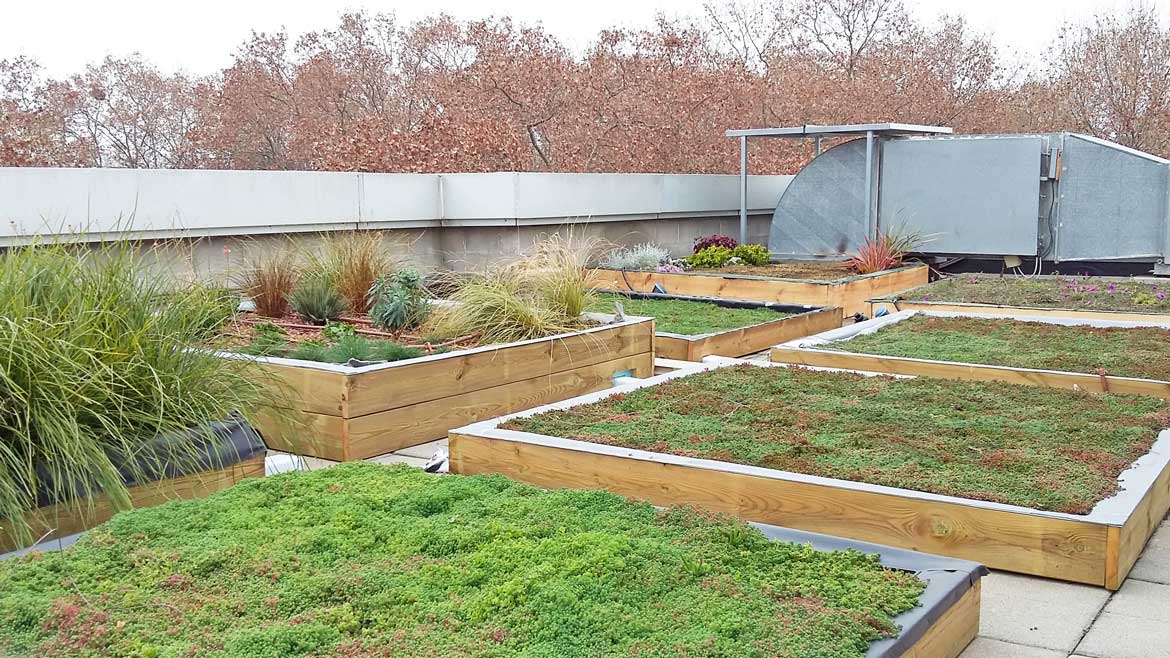
Less and better recycled waste
Another important dimension of universities’ efforts to reduce their environmental footprint is reducing the amount of waste they generate and recycling better. For example, most have begun to eliminate single-use plastics, especially in cafeterias. They have also implemented initiatives such as the ‘Zero Waste Office’ project, launched by the UPF Postgraduate and Doctoral Studies Office to reduce the waste it generates to zero. The measures taken under the project span everything from paper supplies to installing water fountains.
UPC has implemented the ‘UPC Recircula’ [UPC Recirculates] programme to promote waste sorting at 50% of the university’s buildings. It also launched the ‘Recircula Challenge’ [Recirculate Challenge], intended to promote the circular economy. A total of 21 teams from UPC and other universities participated in the first edition last year, working to find ways to eliminate plastic bag and film waste. This year, the second call is focused on sport fabrics.
Including the climate emergency in research
Much of the science and research conducted in Catalonia takes place at the universities, which do excellent research. Their researchers can help think of new ways to prepare for this uncertain future, threatened by climate change. However, the experts interviewed for this article insist that the key will be transdisciplinarity.
‘We have to get economists and engineers, lawyers and chemists, biologists and architects in touch and working together. The crisis calls for global responses, so we will not be able to solve anything by researching it from just one perspective’, said Oliveras, who highlighted UPF’s Planetary Wellbeing initiative, launched in 2019.

The programme is intended to generate and transfer knowledge about the concept of ‘planetary wellbeing’ within the broader framework of the SDGs. ‘It is an initiative that aims to span and connect all the knowledge areas of the university’s research teams and that is focused on research calls related to the SDGs, but also on teaching and impact initiatives’, Figueras explained. ‘We encourage original research in this field, with specific funding calls and involving lecturers from different departments.’
Training students in the climate emergency
Universities need to train the professionals of tomorrow. ‘Why keep training engineers specialized in combustion-engine vehicles when what we need is engineers who know how to design hydrogen engines?’ asked Manel Torrent, director of the Catalan Energy Institute (ICAEN). The ICAEN is the Catalan government agency responsible for developing and implementing Catalan energy policy. It has created an interdepartmental energy efficiency panel in which Catalan universities are represented through the Catalan Secretariat for Universities.
‘Above all, we want to introduce the issue of energy into their curricular plans, for students to learn how to use energy as efficiently as possible, because right now we are wasting it. The fact that the climate vector is not part of the curriculum is a serious problem. We want to teach concepts like energy transition, decarbonization and carbon neutrality. Everything being addressed in primary and secondary school needs to reach the university’, continued Torrent.
'The fact that the climate vector is not part of the curriculum is a serious problem. We want to teach concepts like energy transition, decarbonization and carbon neutrality. Everything being addressed in primary and secondary school needs to reach the university’
However, introducing the climate emergency in the university curriculum is not so simple. ‘Changing syllabi is a very long process. That is why we began with actions to motivate and encourage awareness of this issue, albeit indirectly, focusing on bachelor’s and master’s degree final projects, in which students have to demonstrate that they are familiar with the SDGs and specify which one their project addresses’, said Farga with regard to UPC.
Likewise, last academic year, UPF launched an initiative to recognize bachelor’s and postgraduate degree final projects in planetary wellbeing studies. The university now awards prizes for the best bachelor’s and master’s degree final projects on topics related to social or environmental sustainability. In this year’s edition, the second, the prizes are co-funded by the ESCI-UPF UNESCO Chair in Life Cycle and Climate Change and the UPF Barcelona School of Management.
UB is piloting a curriculum for a transdisciplinary master’s degree offering a global vision of this challenge from the perspectives of law, economics, humanism and science. ‘It is a recent European project to create the university of the future that we are participating in along with the University of Montpellier, Trinity College London, the University of Budapest and Utrecht University’, said Pérez-Vallmitjana.
UPF wants to make the ‘planetary wellbeing’ concept part of its students’ DNA. So far, it has created a minor, with existing subjects from various programmes and new ones that will be added to allow students to take between 30 and 40 credits on planetary wellbeing topics in its various bachelor’s degree programmes. ‘We want to break down the boundaries between more rigid disciplines and blend them together’, said Figueras. ‘Only then, with a global perspective, will we be able to tackle the climate emergency.’
Students have the power
Universities have always been extremely fertile ground for growing youth-led issues. One need only recall that some of the most important civil movements in history, such as the Free Speech Movement, which began on the campus of the University of California, Berkeley (US) in the 1960s, emerged on university campuses around the world.
The same is true of the current struggle, the climate emergency fight. In Catalonia, for example, environmentalist groups from the various public and private universities have come together to create the platform Unim Forces [Joining Forces], which, as its names suggests, pools all the initiatives and actions they are carrying out to boost their impact.
‘We need to set an example, because we are the future leaders, consumers, entrepreneurs and engineers. We have to start facing these problems. We have the power to act. The key is coming together as a group’, said Diana Vidal, a recent UB graduate in Pharmacy, who remains very active in the association of pharmacy students for the environment.
Diana Vidal, a University of Barcelona graduate in pharmacy
At the Faculty of Pharmacy, a few of us were concerned about sustainability, environmental, and waste generation and treatment issues. We felt we needed to organize to carry out local actions. We created a task force on the environment within the student association and started carrying out awareness-raising actions. For example, we set up a table in front of the library and talked to anyone who came up to it about the main problems climate change poses for the world.

Then, we conducted a survey to find out what the university community thought about what was being done to combat climate change at the faculty, including a few simple proposals for small changes. The survey highlighted the concern regarding the use of single-use plastics, especially in the cafeteria, so we focused on trying to solve that. We studied how the cafeteria worked and what we could do to replace plastic water bottles with glass ones, and we drew up a report. Now we are trying get the necessary institutional support to make the change.
The pharmaceutical industry generates a lot of waste and consumes a lot of water. That is barely discussed in the degree programme; neither is climate change. Not until the final year is there a subject on health and environmental management. But sustainability needs to be integrated into the syllabi.
A lot needs to be done with the bachelor’s degree. The pharmaceutical industry generates a lot of waste and consumes a lot of water. That is barely discussed in the degree programme; neither is climate change. Not until the final year is there a subject on health and environmental management. But sustainability needs to be integrated into the syllabi.
Joan Panadès,a fourth-year student on the bachelor’s degree in Environmental Science at the Autonomous University of Barcelona
I got involved in environmental issues in primary school. I have always been interested. When I got to university, I was surprised to learn that they were not represented in the student movement. That made no sense to me, so a classmate and I got involved and started one. We soon managed to bring more people on board. That was four years ago. Since then, we have organized a lot of talks, conferences and workshops to try to generate awareness. We have also carried out actions such as clearing forests. We have contacted the Rector’s Office and made some proposals, which they listened to. In fact, they have provided material and logistical support for many activities.
We have contacted the Rector’s Office and made some proposals, which they listened to. In fact, they have provided material and logistical support for many activities.
We launched the zero-waste campaign, but so far nothing has changed. The UAB bar services are outsourced, so nothing can be done until UAB renews the contract. We have also carried out activities to raise awareness about food waste.
At UAB, there is no transdisciplinarity when it comes to studying ecology. Although some specific degree programmes, like mine, do address it, the vast majority do not even mention climate change. That is absurd, especially in the case of studies that will later influence how society is shaped, such as economics, law or engineering.
Dan Vivas, third-year student on the bachelor’s degree in Materials Engineering at Universitat Politècnica de Catalunya · BarcelonaTech (UPC)
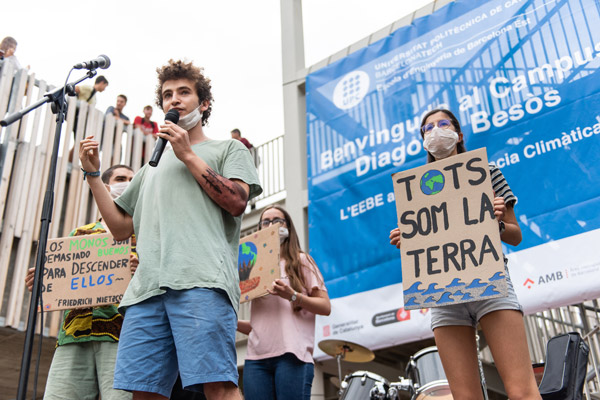
Engineering is often seen as an industrial process, where we learn to design processes to improve transcontinental gas pipelines, make cars or build 5G networks. But engineering is inseparable from the world we live in. It needs to be intrinsically related to the environment. Right now, we are learning to make lighter materials without stopping to think that they are for polluting vehicles. We lack ethics, even though we have the technology and willingness to do things together.
Engineering is inseparable from the world we live in. It needs to be intrinsically related to the environment.
We have spoken with the Rector’s Office and now we will try to encourage extracurricular activities, such as seminars and workshops on environmentalism, to offer students training outside the classroom. But we have also called for a review of the curricula. The world has changed; study programmes have to change as well.
UPClima [UPClimate] is also working with the Rector’s Office to prepare the Climate Emergency Plan. We have compiled more than 200 measures, such as installing more water fountains, opening windows in summer instead of using air conditioning, installing more solar panels, using rainwater and eliminating single-use plastics.
Lola Berna, fourth-year student on the bachelor’s degree in Global Studies at Pompeu Fabra University
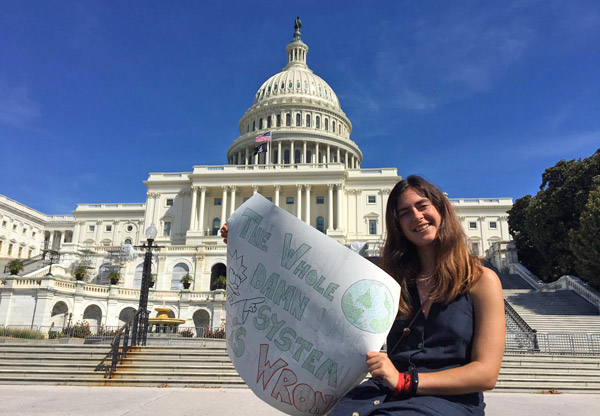
In late 2018, UPF launched the Planetary Wellbeing project. A group of us were interested in it, so we spoke with the head of sustainability at UPF, Martí Boleda. He suggested that we create an association focused exclusively on the environment, because the university did not have one. That is how a group of ten people started the Student Association for the Environment (AEMA). It is amazing how many things we have done in one year, and we plan to do a lot more. The association has given us a voice, the opportunity to do our part to combat climate change. We now have around 40 students, mostly from the Ciutadella campus, although we want to expand and reach all the campuses.
In addition to outreach activities, our flagship action, the one that got people talking about us at the university, was probably the plastic bottle waterfall. We collected all the bottles served at the Ciutadella cafeteria for a week. There were a thousand of them, after just one week. We strung them together to make a waterfall on Building 40, representing all the plastic in the oceans and seas. And we managed to get the cafeteria to stop selling them and to replace them with glass bottles. Recently, we also got them to add a vegetarian menu, the Menu for the Planet, which has a much smaller environmental impact than meat.
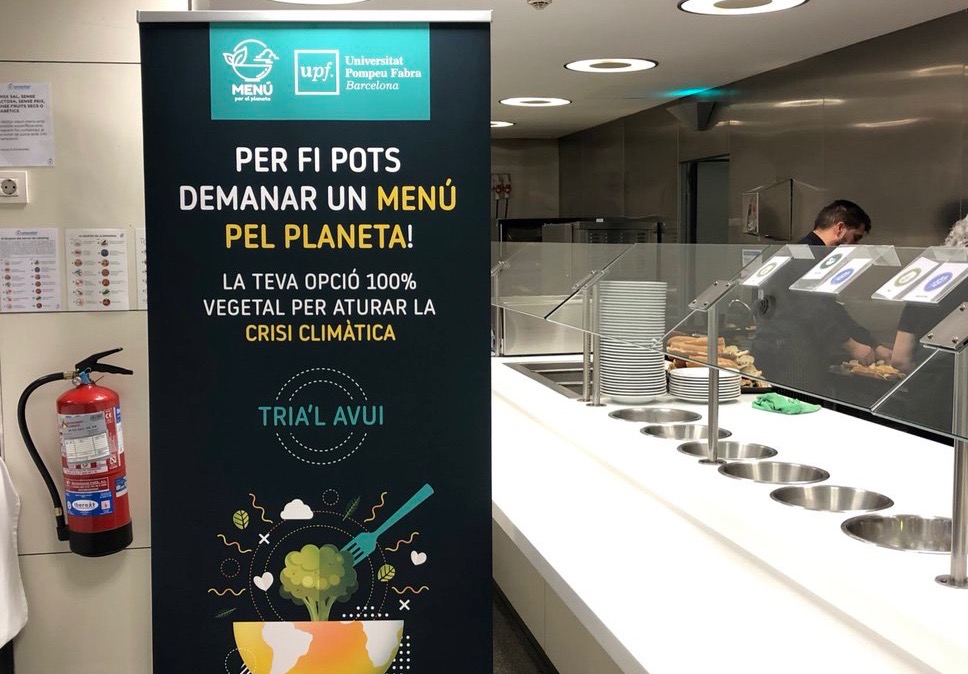
Recently, we also got them to add a vegetarian menu, the Menu for the Planet, which has a much smaller environmental impact than meat
In general, UPF bachelor’s degrees lack a cross-curricular subject, able to cover the principles of sustainability in depth, aimed at everyone, from journalists to economists, because of the enormous role they will go on to play in society. That said, all the master’s programmes offered at the UPF Barcelona School of Management do include the transdisciplinary subject Ethics and Sustainability. It could be made compulsory in all the university’s degree programmes.
The Climate Marathon

February is, traditionally, the coldest month of the year. It is also the one chosen to hold the Climate Marathon, an initiative launched four years ago by the Barcelona Provincial Council. Three editions on, it also has the support of the Catalan government, through the ICAEN. Public institutions participate in it voluntarily, with a twofold objective: to save energy and money, which is then allocated to projects to combat energy poverty; and to raise awareness.
‘The workers themselves organize to come up with ideas for how to save, from lowering the heat to turning it off’, explained Torrent. ‘It is also instructive for us to experience what it means to be cold and to suffer from energy poverty, to empathize with others. Plus, for at least that month, it gets everyone talking about energy. And workers bring that new awareness home with them’, he added.
UPF participated in 2020, with the Mercè building (Rector’s Office). It saved four tonnes of CO2, equal to a reduction of around 30%. It also reduced water consumption by 25.9%, gas consumption by 53.5%, and electricity consumption by 16.1%
Last year’s edition results in a savings of 39,000 euros. This year, the number of participating buildings and departments increased, resulting in a savings of 43,345 euros and a reduction of 167 tonnes in CO2 emissions just in Catalan government buildings. UPF also participated in 2020, with the Mercè building (Rector’s Office). It saved four tonnes of CO2, equal to a reduction of around 30%. It also reduced water consumption by 25.9%, gas consumption by 53.5%, and electricity consumption by 16.1%.
UPF’s carbon footprint
The university takes three areas into account to calculate the university’s carbon footprint. First, it considers everything that UPF owns, such as vehicles or heating boilers, which are 100% dependent on UPF. Second, it considers indirect emissions that UPF itself does not generate, but that are due to its activity. Finally, it considers transport.
Origin of emissions for undertaking the Carbon footprint at the UPF campuses

